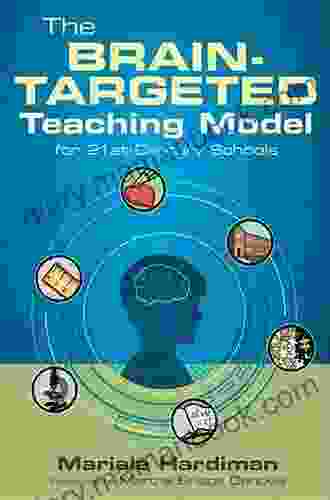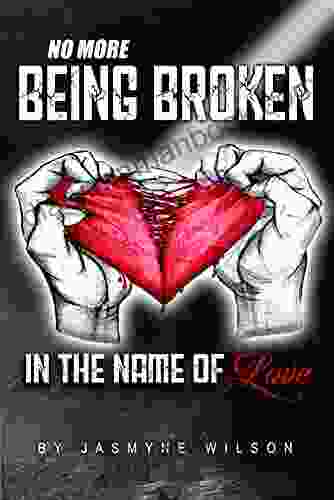No More Being Broken in the Name of Love: Empowering Individuals to Reclaim Their Worth and Happiness

In the realm of relationships, the concept of 'being broken in the name of love' has become a pervasive and deeply ingrained belief. This harmful narrative perpetuates the idea that individuals must endure emotional pain, sacrifice their values, and compromise their well-being for the sake of maintaining a relationship. It is a notion that has caused immeasurable suffering and prevented countless people from experiencing true, fulfilling love.
5 out of 5
| Language | : | English |
| File size | : | 1045 KB |
| Text-to-Speech | : | Enabled |
| Enhanced typesetting | : | Enabled |
| Word Wise | : | Enabled |
| Print length | : | 11 pages |
| Lending | : | Enabled |
| Screen Reader | : | Supported |
Society often romanticizes the idea of sacrificing oneself for love. Movies, novels, and songs portray characters who go to great lengths to win the affection of their beloved, even if it means putting their own needs aside. This romanticization has led many individuals to believe that suffering and self-denial are inherent aspects of love.
However, this belief is not only harmful but also false. True love should not involve pain, sacrifice, or the erosion of one's identity. Instead, it should be a source of joy, fulfillment, and mutual respect.
The concept of 'being broken in the name of love' is often perpetuated by individuals with narcissistic and manipulative tendencies. These individuals may use emotional abuse tactics, such as gaslighting, manipulation, and devaluation, to control and break down their partners.
Gaslighting is a form of psychological manipulation in which an abuser distorts reality and makes their victim question their own sanity. For example, an abuser may deny saying something they clearly did, or they may accuse their partner of being crazy or unstable.
Manipulation is another common tactic used by abusers. They may use guilt, shame, or fear to control their partner's behavior. For example, an abuser may tell their partner that they are worthless without them or that they will leave if the partner does not do what they want.
Devaluation is a process in which an abuser gradually erodes their partner's self-esteem and sense of worth. They may criticize their partner's appearance, intelligence, or accomplishments. They may also compare their partner unfavorably to others.
These tactics can have a devastating impact on an individual's mental and emotional well-being. They can lead to feelings of anxiety, depression, and low self-esteem. Victims of emotional abuse may also experience difficulty trusting others and forming healthy relationships.
If you are in a relationship with someone who is emotionally abusive, it is important to seek help. There are many resources available to support victims of abuse, including domestic violence hotlines, mental health professionals, and support groups.
It is also important to remember that you are not alone. Many people have been through similar experiences, and there is hope for healing and recovery.
Empowering Individuals to Reclaim Their Worth and Happiness
Breaking free from the cycle of abuse and reclaiming your worth and happiness is a journey that requires courage, resilience, and self-love. Here are some steps you can take:
- Recognize the abuse: The first step to breaking free is to recognize the abuse for what it is. This can be difficult, especially if you have been manipulated or gaslighted. However, it is important to trust your gut and be honest with yourself about what is happening.
- Set boundaries: Once you have recognized the abuse, it is important to set boundaries with the abuser. This means making it clear that you will no longer tolerate their harmful behavior. You may need to limit contact with the abuser or end the relationship altogether.
- Focus on self-care: Taking care of yourself is essential for healing from emotional abuse. Make sure you are getting enough sleep, eating healthy foods, and exercising regularly. You may also want to consider seeking professional help from a therapist or counselor.
- Build a support network: Surround yourself with people who support you and love you. This could include family, friends, a support group, or a therapist. Having a strong support network can help you feel less alone and more confident in your ability to heal.
- Practice self-love: One of the most important steps in reclaiming your worth and happiness is to practice self-love. This means treating yourself with kindness, compassion, and respect. It also means accepting yourself for who you are, flaws and all.
Reclaiming your worth and happiness after being broken in the name of love is a challenging but possible journey. By taking the steps outlined above, you can empower yourself to break free from the cycle of abuse and create a life that is filled with joy, fulfillment, and love.
Additional Resources
- The National Domestic Violence Hotline
- RAINN (Rape, Abuse & Incest National Network)
- National Mental Health Association
- Emotional Abuse Help Guide
5 out of 5
| Language | : | English |
| File size | : | 1045 KB |
| Text-to-Speech | : | Enabled |
| Enhanced typesetting | : | Enabled |
| Word Wise | : | Enabled |
| Print length | : | 11 pages |
| Lending | : | Enabled |
| Screen Reader | : | Supported |
Do you want to contribute by writing guest posts on this blog?
Please contact us and send us a resume of previous articles that you have written.
 Top Book
Top Book Novel
Novel Fiction
Fiction Nonfiction
Nonfiction Literature
Literature Paperback
Paperback Hardcover
Hardcover E-book
E-book Audiobook
Audiobook Bestseller
Bestseller Classic
Classic Mystery
Mystery Thriller
Thriller Romance
Romance Fantasy
Fantasy Science Fiction
Science Fiction Biography
Biography Memoir
Memoir Autobiography
Autobiography Poetry
Poetry Drama
Drama Historical Fiction
Historical Fiction Self-help
Self-help Young Adult
Young Adult Childrens Books
Childrens Books Graphic Novel
Graphic Novel Anthology
Anthology Series
Series Encyclopedia
Encyclopedia Reference
Reference Guidebook
Guidebook Textbook
Textbook Workbook
Workbook Journal
Journal Diary
Diary Manuscript
Manuscript Folio
Folio Pulp Fiction
Pulp Fiction Short Stories
Short Stories Fairy Tales
Fairy Tales Fables
Fables Mythology
Mythology Philosophy
Philosophy Religion
Religion Spirituality
Spirituality Essays
Essays Critique
Critique Commentary
Commentary Glossary
Glossary Bibliography
Bibliography Index
Index Table of Contents
Table of Contents Preface
Preface Introduction
Introduction Foreword
Foreword Afterword
Afterword Appendices
Appendices Annotations
Annotations Footnotes
Footnotes Epilogue
Epilogue Prologue
Prologue Yolanda Paptie
Yolanda Paptie Kirsten Anderson
Kirsten Anderson J Tyler Fovel
J Tyler Fovel Isaac Babel
Isaac Babel Jon Giganti
Jon Giganti Pierre Alex Jeanty
Pierre Alex Jeanty L Renee Whaley
L Renee Whaley Michael Fabricant
Michael Fabricant Amanda Gail Click
Amanda Gail Click Barre Toelken
Barre Toelken Janie Crouch
Janie Crouch Myka Hunt
Myka Hunt Mark Batterson
Mark Batterson Sabrina Wagner
Sabrina Wagner Peter S Jensen
Peter S Jensen Bing Xin
Bing Xin Louis Hughes
Louis Hughes Clive Cussler
Clive Cussler Paul Oakes
Paul Oakes Rich Murphy
Rich Murphy
Light bulbAdvertise smarter! Our strategic ad space ensures maximum exposure. Reserve your spot today!

 Benji PowellUnveiling the Artistic Brilliance of Rafael Esteque: Three Defining Traits...
Benji PowellUnveiling the Artistic Brilliance of Rafael Esteque: Three Defining Traits...
 Paulo CoelhoThe Brain-Targeted Teaching Model: Unlocking the Potential of 21st Century...
Paulo CoelhoThe Brain-Targeted Teaching Model: Unlocking the Potential of 21st Century... Alexandre DumasFollow ·10.5k
Alexandre DumasFollow ·10.5k Don ColemanFollow ·13k
Don ColemanFollow ·13k Ira CoxFollow ·14k
Ira CoxFollow ·14k Jedidiah HayesFollow ·19.9k
Jedidiah HayesFollow ·19.9k Salman RushdieFollow ·10.8k
Salman RushdieFollow ·10.8k Bill GrantFollow ·2.6k
Bill GrantFollow ·2.6k Gustavo CoxFollow ·11k
Gustavo CoxFollow ·11k Roland HayesFollow ·3.6k
Roland HayesFollow ·3.6k

 Jorge Luis Borges
Jorge Luis BorgesThe Truth About the 15 Qualities That Men Secretly Admire...
Every woman wants to be loved and...

 Francisco Cox
Francisco CoxPlague Ship: Unraveling the Mystery of the Oregon Files
The Oregon Files, a collection of classified...

 Rudyard Kipling
Rudyard Kipling101 Strategies to Make Academic Vocabulary Stick: A...
Academic vocabulary is an...

 Fletcher Mitchell
Fletcher MitchellPractitioner Guide for Cities, Regions, and Countries:...
The world is...

 Emilio Cox
Emilio CoxOptimization and Security Challenges in Smart Power Grids
Smart power grids (SPGs) are emerging as a...

 Chandler Ward
Chandler WardMiles Davis and the Civil Rights Movement in America: A...
Miles Davis, the iconic jazz...
5 out of 5
| Language | : | English |
| File size | : | 1045 KB |
| Text-to-Speech | : | Enabled |
| Enhanced typesetting | : | Enabled |
| Word Wise | : | Enabled |
| Print length | : | 11 pages |
| Lending | : | Enabled |
| Screen Reader | : | Supported |






